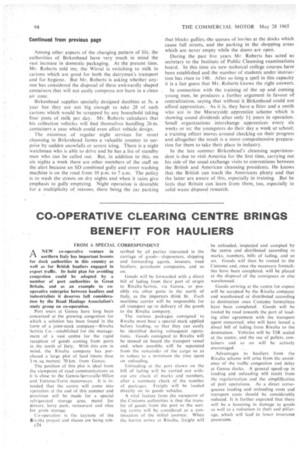CO-OPERATIVE CLEARING CENTRE BRINGS BENEFIT FOR HAULIERS
Page 96

If you've noticed an error in this article please click here to report it so we can fix it.
FROM A SPECIAL CORRESPONDENT
ANEW co-operative venture in northern Italy has important lessons for dock authorities in this country as well as for British hauliers engaged in export traffic. Its bold plan for avoiding congestion could be adopted by a number of port authorities in Great Britain, and as an example to cooperative enterprise between hauliers and industrialists it deserves full consideration by the Road Haulage Association's study group on co-operation.
Port users at Genoa have long been concerned at the growing congestion for which a solution has been found in the form of a joint-stock company—Rivalta Scrivia Co.--established for the management of a vast centre for the rapid reception of goods coming from ports in the north of Italy. With this aim in rnind. the Rivalta company has purchased a large plot of land (more than 3 m. sq. metres) 70 km. from Genoa.
The position of this plot is ideal from the viewpoint of road communications as it is close to the Genoa-Serravalle-Milan and Tortona-Turin motorways. It is intended that the centre will come into operation at the end of this summer and provision will be made for a special refrigerated storage area, motel for drivers, lorry park, restaurant and silos for grain storage.
Co-operation is the keynote of the Rivalta project and shareS are being subs:24 scribed by all parties interested in the carriage of goods—shipowners, shipping and forwarding agents, insurers, road hauliers, petroleum companies, and so on.
Goods will be forwarded with a direct bill of lading from their port of origin to Rivalta-Scrivia, via Genoa, or possibly via other ports in the north of Italy, as the importers think fit. Each maritime carrier will he responsible for all transport up to delivery of the goods to the Rivalta company.
The various packages consigned to Rivalta must bear a special mark applied before loading. so that they can easily be identified during subsequent operations. Goods consigned to Rivalta will be stowed on hoard the transport vessel and, when possible. will be separated from the remainder of the cargo so as to reduce to a minimum the time spent on unloading.
Unloading at the port shown on the bill of lading will be carried out without any check of marks and numbers, after a summary check of the number of packages. Freight will be loaded directly on to goods vehicles.
A vital feature from the viewpoint of the Customs authorities is that the transfer of goods from the port to the sorting centre will he considered as a continuation of the initial journey. When the lorries arrive at .Rivalta, freight will be unloaded, inspected and accepted by the centre and distributed according to marks, numbers, hills of lading, and so on. Goods will then be routed to the Customs and, once the necessary formalities have been completed. will be placed at the disposal of the consignees or else warehoused.
Goods arriving at the centre for export will be accepted by the Rivalta company and warehoused or distributed according to destination once .Customs formalities have been completed. Goods will be routed by road towards the port of loading after agreement with the transport agent concerned, who will have issued a direct bill of lading from Rivalta to the destination. Vehicles will be TIR sealed at the centre, and the use of pallets, containers and so on will be actively encouraged. , Advantages to hauliers from the Rivalta scheme will arise from the avoidance of the traffic congestion and delay at Genoa docks. A general Speed-up in loading and unloading will result from the regularization and the simplification of port operations. As a direct consequence loading and unloading costs and transport costs should be considerably reduced. It is further expected that there will be a lessening in damage to goods as well as a reduction in theft and pilferage, _which will lead to lower insurance premiums.








































































































































































